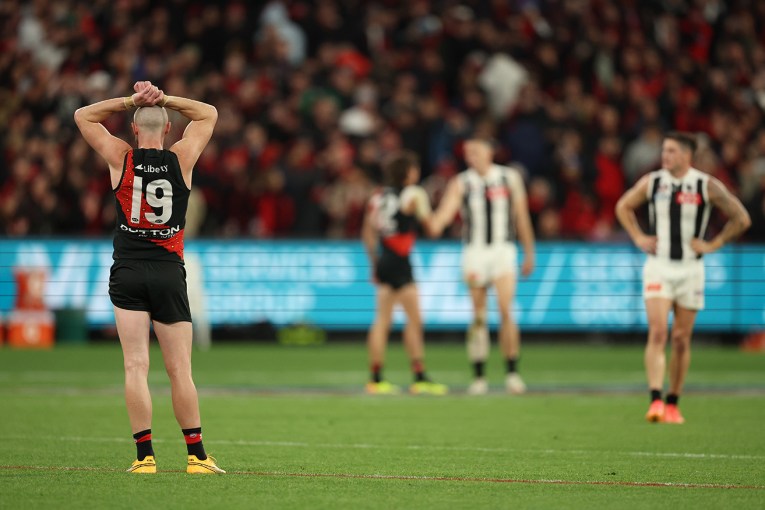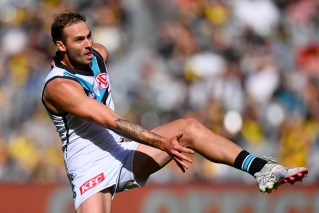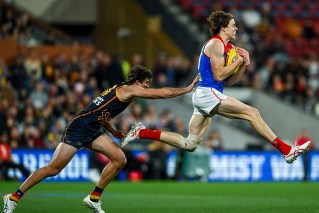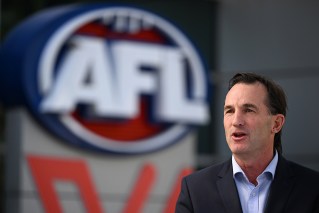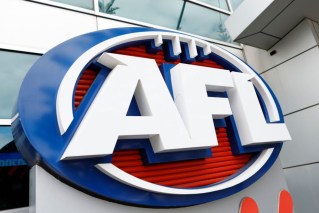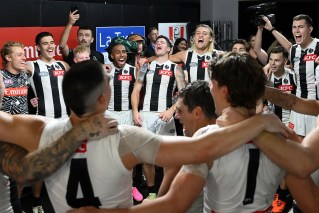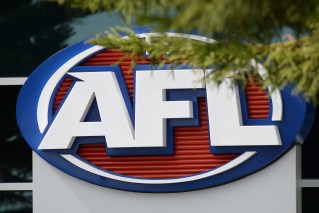James Hird: I opposed ASADA investigation

Suspended Essendon coach James Hird says he did not agree with the AFL club’s decision to request an ASADA investigation into alleged doping at the Bombers.
Hird attended a press conference last year alongside former chairman David Evans and former CEO Ian Robson in which they announced they had asked the AFL and Australian Sports Anti-Doping Authority to investigate the club’s use of supplements in 2012.
• Why Bomber’s the best option for Essendon
• ASADA files Essendon defence
But Hird told the Federal Court he privately disagreed with the decision.
“I disagreed with what Mr Evans was going to say the morning he said it,” he told the court on Monday.
At the time, Hird said he took responsibility for what had happened in Essendon’s football department, but now says the club had told him what to say.
“I was asked by the Essendon Football Club not to shirk the issue,” Hird said.
“I was told it would be better for the club if we went along this path.”
Hird told the court that at the time of the February press conference, he didn’t know the club had contacted ASADA.
“I was surprised David was saying we’d called for an investigation,” he said.
Hird said Mr Evans told him to co-operate with the investigation and tell the truth.
But Hird said he was told to leave out details of a conversation from the day before Essendon’s press conference in which then AFL chief Andrew Demetriou alerted the club to doping claims.
Hird and Essendon are claiming the joint ASADA and AFL investigation was unlawful and doping accusations made against its players should be thrown out.
But ASADA says its probe was legal and if found otherwise, it would create a “nonsense on stilts” situation for the anti-doping body and compromise its stated aims.
Earlier in the court proceedings, Essendon’s legal counsel Neil Young QC said ASADA’s investigation of Essendon’s 2012 supplements program was unlawful and for an improper purpose.
“From its inception the investigation was invalid and unlawful,” Mr Young told the court.
The Federal Court challenge by Essendon and Hird, which began today, comes 18 months after the anti-doping authority launched its investigation into the club’s 2012 supplements program.
Mr Young told the court that ASADA had gone beyond its powers to disclose information to the AFL’s governing bodies.
“All of the investigative information as it arose was handed over and made available to the AFL,” he said.
“That was beyond power.
“As early as 8 February, ASADA knew there were doubts as to the legality of the joint investigation,” Neil Young QC told the court.
“One of its own legal officers in an email on that day expressed the view that ASADA cannot have other parties such as the AFL present during investigation interviews. But that is what happened.”
Hird’s barrister, Peter Hanks QC, told the court ASADA went beyond its powers and did what it had not been authorised to do.
“The decision to conduct the investigation exceeded the authority given by the (ASADA) Act and the NAD (National Anti-Doping) scheme,” he said.
“And the conduct of the investigation also fell outside what the Act authorised and the NAD scheme authorised.
“If that’s right, then the decision to conduct the investigation and its conduct were beyond the power contemplated by the Act … And therefore, they are both nullities.”

James Hird (R) and wife Tania (C) attend the court hearing. Photo: AAP
AFL-ASADA probe ‘wholly consistent’ with anti-doping Act
ASADA’s lawyer, Tom Howe QC, told the court there was nothing in the ASADA Act that prohibited a joint investigation.
“Indeed, the conduct of a joint investigation is wholly consistent with and envisaged by the Act and the scheme,” he said.
“ASADA’s disclosure of information to the AFL as a sporting administration body, for the purpose of enabling it to consider and take the particular disciplinary action in question here, was entirely authorised.
“Participation by ASADA in the so-called joint investigation was simply a means to an overall end. It was not an end in and of itself.”
In May 2013, an external review commissioned by the club found “a disturbing picture of a pharmacologically experimental environment never adequately controlled or challenged or documented within the Club in the period under review”.
Using the findings of ASADA’s interim report in August, the AFL charged the club with bringing the game into disrepute.
The AFL subsequently fined the Bombers $2 million, ruled the club ineligible for the 2013 finals and suspended Hird as coach for 12 months.
Earlier
On Friday, court documents lodged by Essendon revealed the club and Hird were alleging the previous Federal Government pressured anti-doping authorities to fast-track their investigation into the club.
They argued the former Sports Minister Kate Lundy and her staff told investigators in June 2013 that they needed an outcome, and that the process was hampering prospects of being re-elected.
The documents alleged the AFL told ASADA what outcomes it needed in the agency’s interim report, handed down last year.
In June 2014, 34 Essendon past and present players were hit with show cause notices from ASADA – if any players are found guilty of using a prohibited substance they would face suspension from all sport for up to two years.
The defence
ASADA has denied that it acted illegally.
The authority will argue that even if its actions are found to be unlawful, its formal doping allegations against 34 Essendon players should still stand because the club originally supported the joint investigation and did not take legal action to stop it at the time.
—with AAP, ABC
